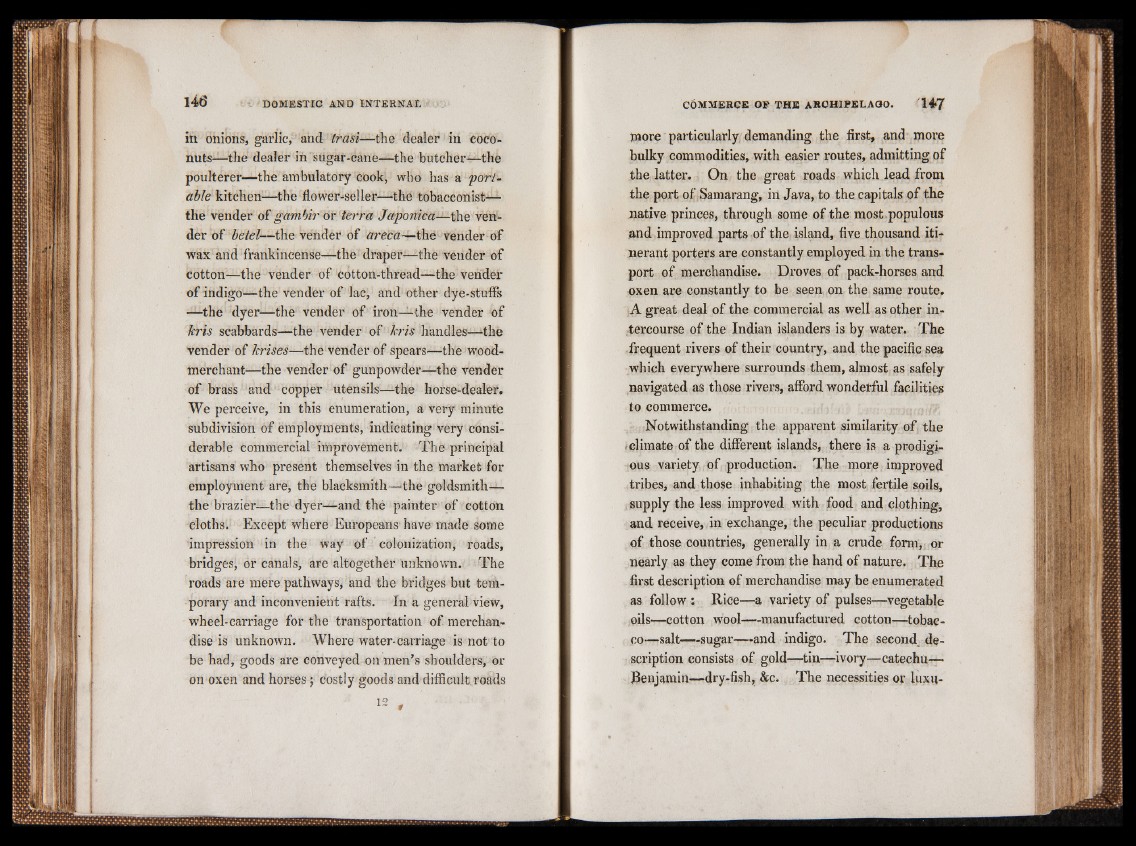
in onions, garlic, and trasi—the dealer in coconuts—
the dealer in sugar-cane—the butcher—the
poulterer—the ambulatory cook, who has a 'portable
kitchen-—the flower-seller—-the tobacconist—
the vender of gambir or terra Japónica-—the vender
of betel—the vender of areca—the vender of
wax and frankincense—the draper—the vender of
cotton—the vender of cotton-thread—the vender
of indigo—the vender of lac, and other dye-stuffs
—the dyer—the vender of iron—the vender of
leris scabbards—the vender of 1er is handles—‘the
vender of ¡crises—the vender of spears—-the wood-
merchant—the vender of gunpowder—the vender
of brass and copper utensils—the horse-dealer.
We perceive, in this enumeration, a very minute
subdivision of employments, indicating very considerable
commercial improvement. The principal
artisans who present themselves in the market for
employment are, the blacksmith—the goldsmith—
the brazier—the dyer—and thé painter of cotton
cloths. Except where Europeans have made some
impression in the way of colonization, roads,
bridges; or canals, are altogether unknown. The
roads are mere pathways, and the bridges but temporary
and inconvenient rafts. In a general view,
wheel-carriage for the transportation of merchandise
is unknown. Where water-carriage is not to
be had, goods are conveyed oil men’s shoulders; or
on oxen and horses j costly goods and difficult, roads
f1f2 0 ■ - ■
more particularly demanding the first, and more
bulky commodities, with easier routes, admitting of
the latter. On the great roads which lead from
the port of Samarang, iii Java, to the capitals of the
native princes, through some of the most populous
and improved parts of the island, five thousand itinerant
porters are constantly employed in the transport
of merchandise. Droves of pack-horses and
oxen are constantly to be seen on the same route.
A great deal of the commercial as well as other intercourse
of the Indian islanders is by water. The
frequent rivers of their country, and the pacific sea
which everywhere surrounds them, almost as safely
navigated as those rivers, afford wonderful facilities
to commerce.
Notwithstanding the apparent similarity of the
? climate of the different islands, there is a prodigious
variety of. production. The more improved
tribes, and those inhabiting the most fertile soils,
supply the less improved with food and clothing,
and receive, in exchange, the peculiar productions
of those countries, generally in a crude form, or
nearly as they come from the hand of nature. The
first description of merchandise may be enumerated
as follow : Rice—-a variety of pulses—vegetable
oils—cotton wool-manufactured cotton—tobacco—
salt—-sugar— and indigo. The second^ description
consists of gold—tin—ivory—catechu—
Benjamin—dry-fish, &c. The necessities or luxy